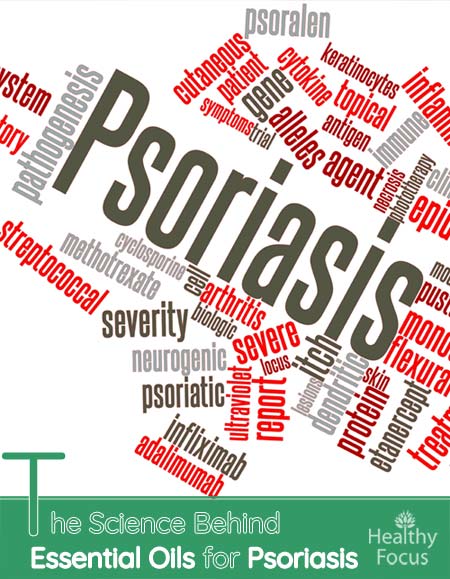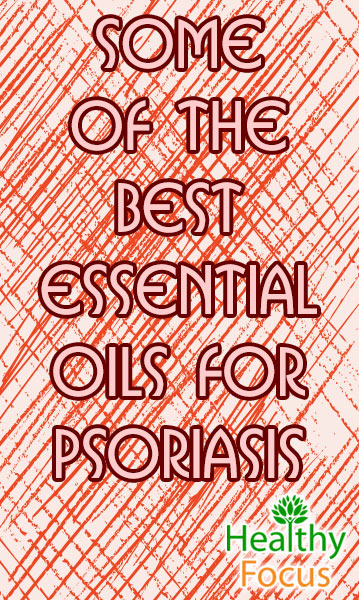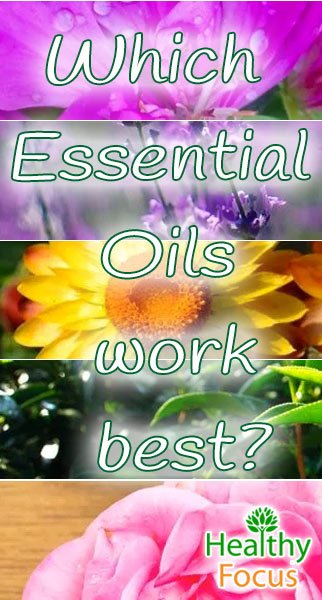Last Updated on April 28, 2018 by Marc Seward
Heres the real deal--it is highly unlikely that essential oils are going to instantly “cure” your psoriasis. So why bother then?
But what if I told you that despite this–they CAN still help manage symptoms and possibly lead to fewer outbreaks. And depending on the type of psoriasis you have–you might respond very well to certain antibacterial essential oils.
First I’ll go over some of the types of psoriasis and discuss what research has to say about a possible bacterial connection. Then give a description of the oils that can help and how they help depending on their properties. And I’ll wrap up with a summary of how to use them and give out links to all the research.
What is Psoriasis?
Psoriasis is a long-term, chronic skin condition characterized by elevated patches of thickened dead skin. This dry, flaky skin is believed to be the result of the rapid reproduction of skin cells. Psoriasis can occur all over the body but is most commonly found on the scalp, knees, and elbows.
Psoriasis is not contagious and while its exact cause is uncertain it is thought to be a hereditary disease and related to the immune system. Psoriasis is a relatively common disease and affects around 7 million people in the United States.
Any age group can be affected and the majority of people will suffer their first outbreak between 15 and 35 years of age. There is no current cure for psoriasis but researchers appear hopeful that one will be found in the future with more money than ever before being plowed into research.
With no cure available, treatment is focused on relieving the symptoms of the disease. Treatment will depend on the type and severity of your symptoms; mild cases of psoriasis are often treated topically with creams, sprays and other lotions while more severe cases of psoriasis are treated with biologics.
There is no quick fix for psoriasis and its precise causes are still a bit of a scientific mystery. While medically prescribed creams and drugs might well be beneficial in the short term, they could also cause side effects and damage your skin in the long run.
Why the Types of Psoriasis Matters
There is some research to suggest that certain types of Psoriasis, specifically Guttate Psoriasis and chronic plaque psoriatic subtypes, might be caused by streptococcal bacterial infections. (1)
Essential oils might provide some natural relief when used over a period of time and unlike cortisone medications will not result in any adverse side effects. Essential oils are used to naturally treat a broad range of skin complaints from acne to eczema and while there is clearly a need for more thorough research, there is mounting belief that these wonderful natural oils can be used effectively as a treatment option for psoriasis.
Best Essential Oils for Psoriasis
With such a huge variety of essential oils to choose from each with a variety of different properties, it is important to know which ones are going to be most effective for your particular complaint.
When it comes to the treatment of psoriasis it must be noted that there is no hard scientific research that essential oils are an effective treatment.
We have to look at the bacterial connection research then link up the antibacterial properties of the essential oils to get there.
Despite this many people report that they work. Anecdotal evidence is growing and the following essential oils are thought to be most effective.
It is worth pointing out that stress is known to be one of the triggers for a psoriasis flare-up and that many essential oils are known to have a calming effect and are used to treat anxiety issues. This fact alone might sway you towards giving essential oils a chance.
Thyme Essential Oil
Apart from being an essential ingredient in the kitchen, the thyme herb has plenty of other uses and is also harvested for its therapeutic qualities. Thyme Essential oil has numerous health benefits and is frequently used to treat a variety of ailments.

Thyme essential oil has robust antiseptic, antibacterial, and anti-fungal which makes it the ideal treatment for skin issues like athlete’s foot, eczema, and even psoriasis. Thyme essential oil also has natural anti-inflammatory properties and helps reduce swelling and itchiness on the skin.
Despite its myriad benefits, you should be cautious when using thyme essential oil and it should never be taken internally. Thyme essential oil can be used on the skin but should never be used undiluted. Instead, you should mix it with the carrier oil of your choice, like jojoba or argan oil–both of which can also help with skin conditions. Thyme oil can still cause a skin reaction even when it is diluted so it is important to spot test it on a small area of skin first.
Thyme oil was shown to be effective against 120 multidrug-resistant bacterial strains. (2)
Other oils with a similar chemical composition include Marjoram, Oregano, and Niaouli.
Geranium Essential Oil
Geranium essential oil has been called the ‘poor man’s rose’, but don’t let that slightly derogatory moniker put you off geranium and rose essential oils share very similar therapeutic traits.
Geranium essential oil is used by aromatherapists to deal with ailments ranging from anxiety and stress disorders to treating cuts and bruises. Geranium essential oil is also a popular treatment for skin disorders like acne and psoriasis because of its healing antibacterial and antifungal properties.
Rose Essential Oil
Rose essential oil has nearly the same therapeutic qualities as geranium oil but is the more expensive option.
Lavender Essential Oil
Because of its diverse range of therapeutic uses, lavender essential oil is a ‘must have’ addition to your essential oil collection. While it is often used to aid sleep and to alleviate the symptoms of stress, it also contains potent antiseptic and antibacterial agents which help ease a variety of skin complaints.
Two of the main compounds found in lavender oil, Linalool, and linalyl aldehyde reduce pain perception and to prevent or limit inflammation. These cooling anti-inflammatory effects help soothe the pain associated with psoriasis.
According to the University of Maryland Medical Centre, there is evidence from research to suggest that lavender essential oil can decrease the scaly skin patches which are a symptom of psoriasis. Psoriasis flare-ups can occur as a result of stress, and lavender oil’s calming effect might help to relieve your stress and anxiety.
Helichrysum Essential Oil
Helichrysum essential oil, otherwise known as Immortelle oil is derived from the flowers of the helichrysum plant and is well known for its many therapeutic properties. It contains antiseptic, antifungal and anti-bacterial properties and is widely used to treat skin complaints from eczema to psoriasis. Helichrysum essential oil is a mild oil and can be safely applied directly to the skin either undiluted or combined with a carrier oil.
 Tea Tree Essential Oil
Tea Tree Essential Oil
Tea tree essential oil is produced with the leaves of the native Australian tea tree plant. The benefits of the leaves were well known to the native Australians who valued them for their healing qualities.
The British explorer James Cook named the tree after witnessing native Australians brewing tree with its leaves in the 18th century. Cook was so taken with the medicinal benefits of the tea that he brewed his own batch for his crew to prevent scurvy.
Tea tree essential oil is well known for its ability to treat skin complaints owing to its powerful antibacterial, antifungal, and antiviral properties. Tea tree essential oil is considered to be safe to use topically either diluted or otherwise and very few people are thought to have an allergic reaction but you should test it on a small section of skin at first to check for any reaction.
Other Antibacterial Essential Oils might also help–if your psoriasis might be based or triggered by bacteria.
You might choose to create your own essential oil blend rather than using single oil. Essential oils are often more effective when blended and there are a number of blend recipes online that you might like to try out.
How to Use Essential Oil for Psoriasis
- Topical Application
You can apply your chosen essential oil directly onto the affected area of the skin twice a day for as long as necessary. Make sure that you dilute your essential oil with a carrier oil if you are worried about an allergic reaction. Coconut, jojoba, and almond used alone or combined make for ideal carrier oils. Some oils like thyme essential oil are too strong to be applied directly to the skin and need to be diluted first. - Add them to your bath
Add 3 or 4 drops of essential oil to your bathtub and take a nice long soak to relieve the burning and itching sensations. Make sure that you do not add the essential oils until the tap water has finished running otherwise you will lose the oil through evaporation. - Diffuse
Diffusing essential oils like lavender oil calms your mind and reduces stress, a common cause of psoriasis outbreaks.
References
1) https://www.ncbi.nlm.nih.gov/pubmed/20607546
2) https://www.ncbi.nlm.nih.gov/pubmed/22103288
Leave a Reply
You must be logged in to post a comment.